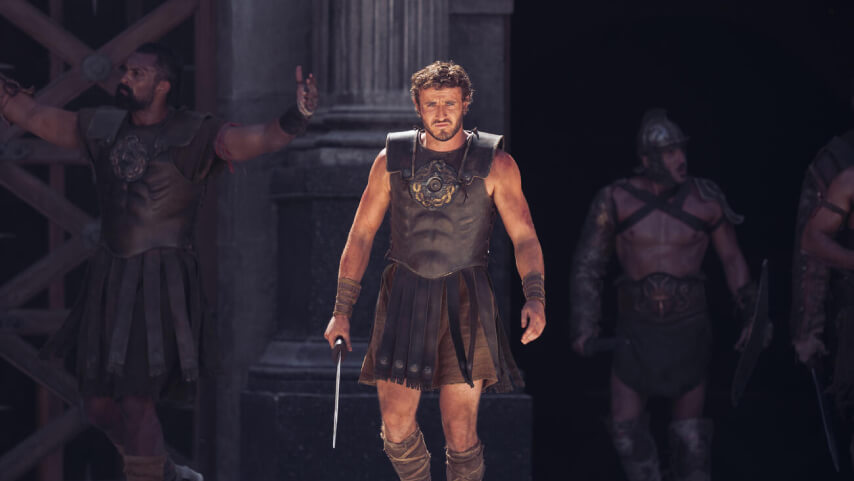Exhausted, decadent imperial decline prevails in maximalist sequel Gladiator II
Both bad history and bad historical fiction, Ridley Scott's maximalism never replicates the charisma of Maximus.
Photo: Paramount Pictures
A product of our era of legacy sequels and zombified intellectual properties, Ridley Scott’s Gladiator II sets out to one-up its fondly remembered predecessor with more grandiose set pieces, more convoluted political intrigues, and twice as many creepy, pasty emperors. The overarching idea of this exercise in maximalism à la late-period Scott has something to do with Rome (and, perhaps, any present-day institutions that Rome might stand in for) becoming a twisted parody of itself, ruled by a perverted Romulus and Remus duo who entertain the populace by recreating ancient naval victories in a flooded Colosseum. But whatever the thematic parallels (intended or not), one can’t help but feel as though the whole movie were periodically bellowing the original’s most famous line: “Are you not entertained!?” The answer is no, not really, and no amount of digital gladiatorial carnage or bug-eyed overacting can mask the prevailing air of exhausted, decadent imperial decline.
But then, what’s the point of making a second Gladiator movie if not to cash in? The original doesn’t really leave any material for a sequel, given that (spoiler alert!) its charismatic hero, the general-turned-gladiator Maximus, dies in the end. There were attempts by Scott and others to produce a follow-up in the 2000s, with an eye toward having Russell Crowe reprise his Oscar-winning turn as Maximus, logic and the finality of death be damned; among those failed efforts was a notorious rejected screenplay by the musician Nick Cave that followed Maximus into the underworld and back to the land of the living on an allegorical journey through the twilight of the Roman pantheon, the beginnings of Christianity, and eternal cycles of violence and damnation, ending in the present day. (The script, which is easy to find online, is worth a read for Cave fans and Hollywood boondoggle aficionados.)


![HBO teases new Euphoria, Larry David, and much more in 2026 sizzle reel [Updated]](https://img.pastemagazine.com/wp-content/avuploads/2025/12/12100344/MixCollage-12-Dec-2025-09-56-AM-9137.jpg)





































